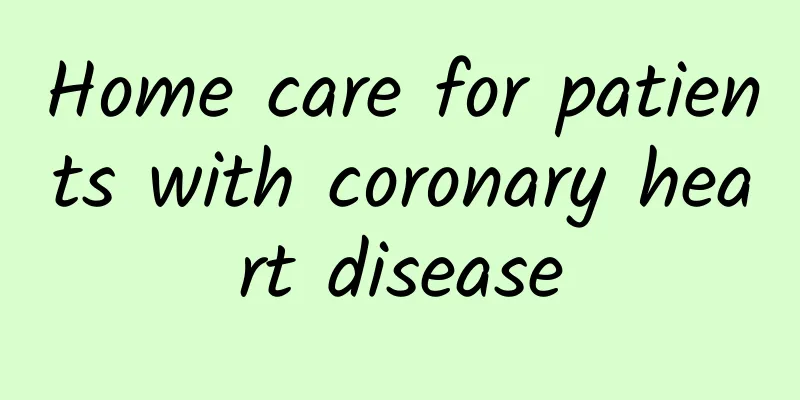Home care for patients with coronary heart disease

|
1. Lifestyle 1. Have a healthy schedule Ensure adequate sleep, preferably about 7-8 hours a day. Avoid staying up late and overwork, and develop regular work and rest habits. Taking a proper nap of 30 minutes to 1 hour at noon can help relieve fatigue. 2. Moderate exercise Choose appropriate forms of exercise, such as walking, Tai Chi, yoga and other low-intensity exercises. Avoid strenuous and competitive sports. The intensity of exercise should be moderate, not causing chest tightness, chest pain, palpitations and other discomfort symptoms. The exercise time can be gradually increased to about 30 minutes each time, 3-5 times a week. 3. Dietary adjustments Control your food intake and avoid overeating. Follow the principle of eating small and frequent meals to reduce the burden on your heart. A low-salt diet with a daily salt intake of no more than 6 grams. Reduce the intake of high-salt foods such as preserved foods and processed meats. Low-fat diet, reduce the intake of high-fat foods such as animal fat and fried foods. Increase the intake of foods rich in unsaturated fatty acids such as fish, beans, and nuts. Eat more fresh vegetables and fruits to ensure adequate daily intake of dietary fiber, vitamins and minerals. 2. Disease monitoring 1. Symptom observation Pay attention to whether there are chest pain, chest tightness, palpitations, shortness of breath and other symptoms. Record the time, frequency, degree and inducing factors of the symptoms. If symptoms worsen, persist, or are accompanied by symptoms such as difficulty breathing, dizziness, sweating, etc., seek medical attention immediately. 2. Measure vital signs regularly Measure blood pressure and heart rate regularly to understand changes in the condition. Blood pressure should be controlled below 140/90 mmHg and heart rate should be maintained at 60 - 100 beats/minute. If there are abnormal fluctuations in blood pressure or heart rate, you should seek medical attention promptly to adjust your treatment plan. 3. Psychological care 1. Maintain a positive attitude Patients with coronary heart disease should maintain an optimistic and positive attitude and avoid negative emotions such as tension, anxiety, and depression. You can relieve psychological stress by listening to music, reading, and communicating with family and friends. 2. Family support Family members should give care and support to patients, encourage them to actively cooperate with treatment, and avoid showing excessive worry or nervousness in front of patients, so as not to affect their mood. IV. First aid measures 1. Always have emergency medicines First aid medicines such as nitroglycerin and quick-acting heart-saving pills should always be available in the home and placed where patients can easily access them. Patients and their families should be familiar with the usage and precautions of emergency medicines. 2. Emergency treatment If the patient has chest pain, chest tightness and other symptoms, he should stop the activity immediately and rest on the spot. Let the patient take nitroglycerin or quick-acting heart-saving pills sublingually. If symptoms persist, call 120 immediately for emergency assistance and closely monitor the patient's condition while waiting for emergency personnel. Article author: Huang Yaru Author unit: Zhangzhou Second Traditional Chinese Medicine Hospital |
<<: How many stomach care misunderstandings have you encountered?
>>: Are children's respiratory diseases at high risk again? Expert response →
Recommend
What are the treatments for endometrial cancer?
Endometrial cancer has many harmful complications...
Several common misunderstandings and prevention knowledge about respiratory infectious diseases in autumn and winter
Expert Profile: Zhu Shuyi, chief physician of pub...
The pregnancy test stick is blank with no bars
After having sex without proper protection measur...
Gestational age and amniotic fluid index comparison table
The amniotic fluid of pregnant women plays an imp...
What is the detailed introduction of clams? How much does a pound of clams cost?
Clam meat is delicious, nutritious, high in prote...
Black sesame pills may not save your hair loss! What is the real secret to growing hair?
Recently, the topic #How can young people prevent...
Biochemical pregnancy test paper picture
Once a woman finds that her menstruation is delay...
Is it normal to have black blood after taking medicine?
After medical abortion, if black blood is dischar...
Can allergic rhinitis really be cured? Remember this little recipe~
Allergic rhinitis is a disease that causes global...
What causes appendicitis in women?
From a professional perspective, appendicitis is ...
How to correct pelvic anterior tilt after childbirth
Some mothers successfully lose weight three month...
What foods don't taste salty, but are high in salt? In fact, every kitchen has them...
Everyone now advocates a low-salt diet Very sensi...
What brand of mobile hard disk has good quality? How to identify the quality of mobile hard disk
Most of the mobile hard disks sold on the market ...
What are the hazards of tofu pudding-like leucorrhea
Leucorrhea is a condition that all female friends...









